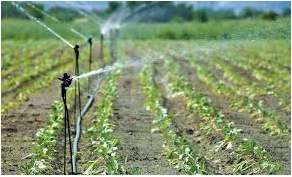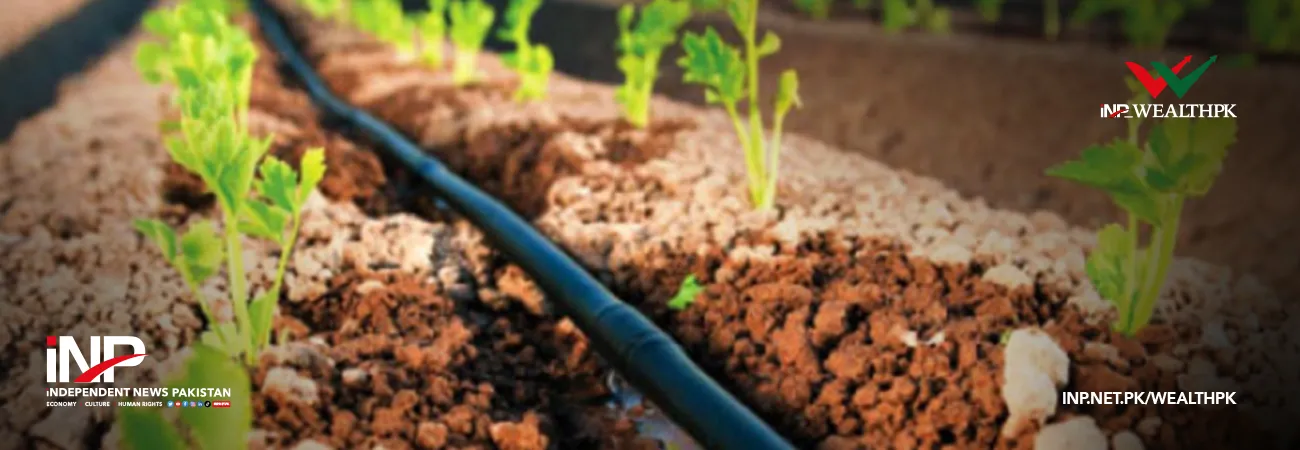INP-WealthPk
Muhammad Luqman
Farmers in Pakistan’s Punjab province are grappling with an increasingly critical challenge of water scarcity. In addition to reduced river flows, groundwater levels continue to drop, and traditional irrigation methods waste valuable resources.
The urgency for sustainable water management has never been greater. Among the innovative solutions gaining traction is drip irrigation—a method that delivers water directly to plant roots with remarkable precision. This technique offers hope for improving crop yields, conserving water, and securing the future of agriculture in the region.

Drip irrigation consists of a network of pipes, valves, tubing, and emitters that slowly release water directly at the base of each plant. Unlike flood or canal irrigation—which often leads to water loss through evaporation, runoff, and seepage—drip irrigation minimizes waste and maximizes efficiency. This system is especially suitable for arid and semi-arid regions, making it ideal for much of Punjab, where climate change and overuse of water resources have heightened the threat of drought.
Globally, the adoption of water-conserving technologies such as drip and sprinkler-based pressurized irrigation systems is widespread. Over 50 countries have switched to these high-efficiency methods. In neighboring Iran, 24 percent of the irrigated area is under drip irrigation; Turkey uses it for 38 percent, and India for 22.57 percent of irrigated land. In contrast, Pakistan lags far behind.
The area under HEIS in the country is limited to just a few thousand hectares—only about 0.1 percent of the total irrigated land—mainly restricted to orchards, greenhouses, and tunnel farming in Punjab. According to water management experts, flood irrigation remains prevalent in Punjab despite its inefficiency, primarily due to the lack of modern equipment and technical skills among farmers.
“The initial installation cost of drip systems is unaffordable for small farmers. They feel the upfront investment outweighs the savings and yield improvements,” said Aamir Mushtaq, Director of the Water Management Department, Punjab. Talking to WealthPK, he said that many farmers believe flood irrigation helps recharge groundwater and manage soil salinity, which further discourages the adoption of drip irrigation.
Mushtaq noted that despite a 75 percent government subsidy on drip irrigation in Punjab, adoption remains very low due to persistent misconceptions. “Pakistan has no option but to embrace new technologies and improve the water-use efficiency of traditional surface irrigation systems,” he emphasized, adding that drip irrigation also reduces energy bills and labor costs. According to farmers' organizations, the lack of awareness and absence of after-sales support from equipment dealers are major obstacles to the wider adoption of drip irrigation in Punjab.
“Small farmers hesitate to install drip irrigation systems out of fear that spare parts won’t be available if the system fails,” said Ebadur Rehman Khan, Director of the Farmers Association of Pakistan (FAP). Talking to WealthPK, he said that flood irrigation is considered cheap and suitable for most conventional crops and land types—except for sandy and uneven terrains—whereas drip irrigation is ideal for those more difficult conditions, especially in water-scarce areas.
“Farmers find drip irrigation more expensive and harder to manage compared to traditional flood irrigation,” Ebadur Rehman said. He also alleged that the Punjab government’s 75 percent subsidy has been ineffective due to bureaucratic red tape. “Even with the subsidy, the cost of drip irrigation systems installed on farms ends up being higher than the market price,” he added.
Despite its limitations, drip irrigation remains a practical and scalable solution to Pakistan’s growing water crisis. To unlock its full potential, greater awareness, reliable technical support, and streamlined government support mechanisms are essential, the FAP director concluded.
Credit: INP-WealthPk












